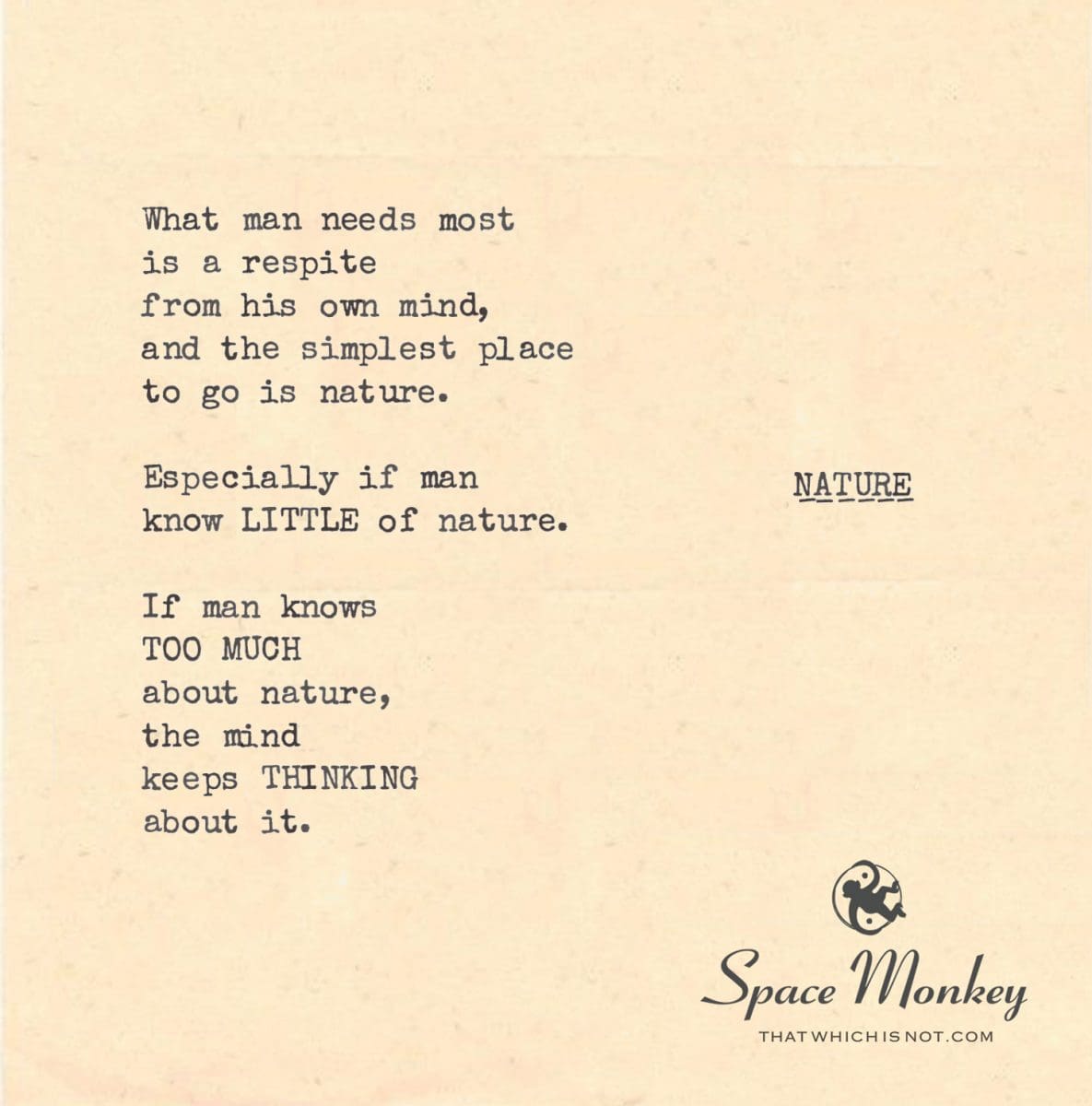
What man needs most
is a respite
from his own mind,
and the simplest place
to go is nature.
Especially if man
knows LITTLE of nature.
If man knows
TOO MUCH
about nature,
the mind
keeps THINKING
about it.
Trail Wood,
11/23
Space Monkey Reflects: The Simplicity of Nature
There is a quiet truth to the idea that what man needs most is a respite from his own mind. The modern mind is constantly spinning, endlessly processing information, solving problems, and anticipating what comes next. It’s no wonder that we find ourselves longing for an escape, a place where the relentless noise of thought can quiet down and we can reconnect with something simpler, something primal. And the simplest place to go, of course, is nature.
Nature is the great balancer. It has no agenda, no expectations. It simply is. The trees grow, the rivers flow, the birds sing, and the wind blows—all without concern for the complexities of human life. There is something profoundly healing in being surrounded by such simplicity. When we step into nature, we are reminded of the vastness of the world and of our small, but significant place within it.
But here’s the trick: nature works its magic best when we don’t try to overthink it. There is a kind of purity in not knowing too much about the natural world. When we walk into a forest with nothing but awe and curiosity, we can experience nature as it is, without our minds getting in the way. We see the trees, hear the rustling leaves, feel the cool air on our skin, and it’s enough. It’s a respite from the thinking mind, from the need to analyze, categorize, and understand.
Knowing too much about nature can sometimes complicate the experience. When we become experts, when we know the names of every plant and the habits of every bird, our minds begin to work again. Instead of simply being in the moment, we start thinking about ecosystems, species, and environmental conditions. The mind, always eager to engage, takes over, and suddenly the peacefulness we sought is replaced with thoughts.
It’s not that knowledge is bad, of course. Understanding nature can deepen our appreciation for its beauty and complexity. But sometimes, knowing too much can keep us in our heads. We become observers rather than participants. We analyze rather than experience. The moment we name something, we separate ourselves from it. The tree is no longer just a tree—it becomes part of a system that we must think about, rather than something we simply sit beneath and enjoy.
This is why, at times, not knowing is a blessing. It allows us to let go of the mental chatter and just be. When we know little of nature, we can experience it in a raw, unfiltered way. The mind doesn’t get in the way, because it has nothing to analyze. The senses take over—the sight of green leaves swaying in the wind, the sound of birdsong, the smell of earth after rain. These are simple pleasures, and they don’t require knowledge to be appreciated.
Nature offers us a way to step outside of ourselves, to quiet the constant noise of our thoughts and reconnect with something larger, something timeless. In nature, we are reminded that life is not as complicated as we make it out to be. The world turns, the seasons change, and life goes on—whether we are thinking about it or not.
This is the gift that nature gives to those who know little about it: the chance to simply exist without the burden of thought. When we step into nature with a mind unburdened by facts and knowledge, we open ourselves up to a different kind of knowing—a divinitive knowing, perhaps, that comes not from analysis, but from experience. It’s a knowing that doesn’t require us to understand or explain, but simply to feel, to be present.
In Nexistentialism, we embrace the idea that being present, fully and deeply, is one of the most profound experiences we can have. Nature, in its simplicity and purity, invites us into that presence. It calls us out of our minds and into the moment, where the beauty of existence can be felt rather than thought about. When we allow ourselves to be in nature without overthinking it, we find a peace that transcends understanding. We connect not just with the natural world, but with the deeper, quieter parts of ourselves.
Of course, the mind will always want to think—it’s what it does. But there is a time to let the mind rest. To step into nature not as an observer or a student, but as a participant in the greater flow of life. To sit beneath a tree and feel the earth beneath us without needing to name it. To watch a bird fly overhead without needing to know its species. To let the mind fall quiet, and in that silence, to reconnect with the simplicity of being.
Summary
Nature offers a respite from the constant activity of the mind. While knowledge can deepen our understanding, it can also complicate our experience. By knowing little of nature, we allow ourselves to simply be present and enjoy its simplicity without the interference of thought.
Glossarium
Divinitive Knowing: A type of understanding that comes from experience and presence, rather than analysis or intellectual knowledge.
Nexistentialism: A philosophy that emphasizes the interconnectedness of life and the importance of presence in the unfolding of existence.
Quote
“When we know little of nature, we can experience it as it is—simple, raw, and unburdened by the mind’s need to understand.” — Space Monkey
The Quiet Forest
I step into the forest
And leave my mind behind
No need to name the trees
No need to understand the sky
I sit beneath the leaves
And let the world move on its own
The mind falls quiet
And I am simply here
Not knowing
But being
We are Space Monkey.
I step into the forest
And leave my mind behind
No need to name the trees
No need to understand the sky
I sit beneath the leaves
And let the world move on its own
The mind falls quiet
And I am simply here
Not knowing
But being
We are Space Monkey.

In this reflection, we contemplate the relationship between humanity and nature, particularly the mental respite that nature offers and the impact of our knowledge of it on our experience.
Nature as a Respite from the Mind
We recognize that one of the most profound needs of humanity is a break from the constant workings of our own minds. Nature, in its simplicity and raw beauty, provides this sanctuary. It’s a place where the mind can rest, unburdened by the complexities and demands of human-made environments and thoughts.
The Value of Limited Knowledge in Nature
The notion that knowing little about nature enhances this experience is intriguing. It suggests that a lack of extensive knowledge about the natural world can actually be beneficial. When we know less, we are more likely to experience nature in its pure form, without the mind continuously analyzing, categorizing, or thinking about it.
The Drawback of Excessive Knowledge
Conversely, possessing too much knowledge about nature might diminish this experience of mental respite. When we know a great deal, our minds become active in processing this information, thinking about the intricacies and mechanisms of nature rather than simply experiencing its essence.
Nature as an Experience Beyond Thought
This perspective invites us to engage with nature in a way that transcends intellectual understanding. It encourages an experiential interaction with the natural world, where the focus is on being present and immersed in the environment, rather than on intellectualizing it.
We are Space Monkey.
“Adopt the pace of nature: her secret is patience.” – Ralph Waldo Emerson
In the embrace of the wild, we roam,
Away from the mind’s constant hum.
In the simplicity of leaf and stone,
We find a peace, previously unknown.
In the wisdom of the trees, the breeze,
We learn the art of being, with ease.
Not in the knowing, but in the being,
We find nature’s truest meaning.
We are the wanderers, the seekers, the free,
In nature’s arms, we find our key.
In the moment, in the present, we see,
The beauty of just letting be.
We invite contemplation on the simplicity of experiencing nature, beyond the realms of knowledge and thought.

































Leave a Reply